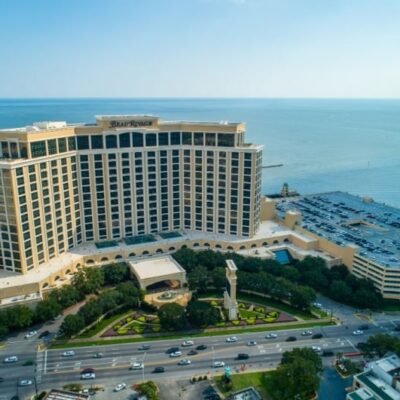Monday, Aug. 18, 2025 | 2 a.m.
The dry summer heat had begun to settle over Las Vegas as the man left his third-floor apartment at the Paradise Royale.
It was still early on July 26 as he descended the open stairs and walked past the window of his neighbor, Michael Valentic. On most days, Valentic — a retiree who lived by the clock — would walk to the parking lot at 6:37 a.m. and see the man in a black BMW, returning from an overnight security guard shift at the Horseshoe Casino.
Today the man was leaving, not arriving, and Valentic thought he looked like he had somewhere to be: He was toting several packs and shouldering a bulky canvas bag. The man stepped into the courtyard before rounding the corner, out of sight.
Two days later, news updates flashed on Valentic’s computer screen in quick succession. There had been an attack at a Manhattan office tower; the gunman had entered the high-rise undetected; he had driven from Las Vegas to New York; he had fatally shot four people before killing himself.
Within hours, Valentic saw a surveillance photo of the gunman strutting toward 345 Park Avenue, an assault rifle dangling at his side. Valentic gasped.
The killer was the man who lived upstairs.
In the weeks since the shooting, interviews with neighbors, a colleague, a landlord and former housemates, as well as public records and police documents from New York and Las Vegas, have revealed that the man, 27-year-old Shane Tamura, had been struggling for years, a worry to his family and sometimes a problem for police.
A mental health episode, a traffic stop and an arrest at a casino were captured on officers’ body-worn cameras; audio recordings of 911 calls made by his mother showed her concern that Tamura was suicidal.
He took prescription medicine for anxiety, depression and bipolar disorder, his mother and police officials in New York said. He scribbled suicide notes showing his obsession with brain injuries. He believed his poor mental health was the product of playing football and repeated knocks to the head.
In Las Vegas, Tamura appeared to have few friends, save for a gray-and-black tabby cat that walked the halls of the Paradise Royale. He had worked guarding gated communities, a good gig for a man who lived in a cheap room off the Vegas Strip. Recently, he had been on casino surveillance, roaming among the nocturnal blackjack gamblers and tourists, watching as they fed money into the beeping, blaring slot machines.
But as he moved from job to job and room to room, Tamura was quietly drifting beyond control. And on July 28, 2,500 miles away, he committed New York’s deadliest single shooting in 25 years.
‘Lightning in a Bottle’
A decade before, Tamura’s life had looked much different — before the 911 calls, before the casino floor run-ins, before the guns.
In Santa Clarita, California, he had been a standout running back and wide receiver at Golden Valley High School. The Santa Clarita Signal, a local newspaper, attributed the team’s big wins in 2014 to Tamura’s big plays. In one article, the head coach for the team, the Grizzlies, called him “lightning in a bottle.”
But he transferred to a charter school in the San Fernando Valley for his senior year. He withdrew completely months before graduation.
By the time he turned 22, Tamura was living in Las Vegas.
The Nevada Private Investigators Licensing Board, which regulates private patrol officers, issued him a work card in December 2019. Securitas Security Service hired him two months later, and he was a useful employee. The Henderson Police Department said he had flagged two incidents that year at a gated community where he worked. Those conversations led to the arrest of two trespassers and a theft investigation.
In February 2020, Tamura rented a room in a Spanish revival house in a gated community on Gracious Lady Street near Barnacle Bay Avenue. The beige stucco building had a revolving cast of tenants, renting rooms for around $500. Some stayed for a year, some for a few months.
People who lived in the house in the pandemic’s early days said that Tamura’s face looked familiar but only just, their interactions in the lockdown being few and far between. His landlord, Joy Ekpo, never received a complaint about him before he moved out that May.
Tamura’s parents, a nurse and a retired Los Angeles police officer, would join him in Las Vegas by the end of the year. Michelle and Terrence Tamura sold their house in Santa Clarita and in January 2021 bought one in Desert Shores, a community with expansive human-made lakes and sweeping views of the La Madre Foothills.
By then, Tamura had moved to the Budget Suites. A massive red and yellow sign towered over the sprawling apartment complex, the words “NOW Weekly & MONTHLY” rentals blazoned on the front. The apartments were on Rancho Drive, a busy four-lane artery, a landscape of parking lots and barren sidewalks.
It was the stage for Tamura’s unraveling.
‘He Just Can’t Take It Anymore’
On Sept. 12, 2022, his mother called 911.
Michelle Tamura told the dispatcher that her son was suicidal.
He had a gun.
She stood in front of Building A at Budget Suites, talking on the phone with the dispatcher. Sounding exhausted but measured, she described how her son was slamming objects as he cried in apartment 3008.
He took sleeping pills for insomnia, she said; he was under a doctor’s care for depression; he suffered chronic migraines, thanks to sports-related concussions; he smoked weed; he had a concealed carry permit; he kept a black handgun in his backpack.
She told the dispatcher that her presence was “making him worse,” so she stepped outside.
“He just said he just can’t take it anymore,” Tamura told the dispatcher. She added, “I’m afraid to leave.”
Down on the second floor, a neighbor, Heather Koller, 68, watched as police and emergency medical workers arrived. She was a retired police officer from Lowell, Massachusetts, and she was used to seeing the police come to Budget Suites for calls about burglaries and drug deals.
This was different. There was a man holed up with a gun, and his intentions were unknown.
When paramedics got Shane Tamura out, Koller returned to her apartment and closed the door. She never saw him again.
Confrontation at a Casino
The police took Tamura away and put him on what Nevada calls a mental health hold, which lets authorities place a person under psychiatric care for as long as 72 hours. But Tamura was soon back in Las Vegas’ 24-hour world of winners and losers.
He was hired by the Horseshoe Casino on July 18, 2023, as a security guard. Two months later, he was arrested at Red Rock Resort Casino & Spa, about 18 miles from the gambling house where he worked. He had refused to hand over his identification card when he went to the cage to cash in his gambling chips, footage of the episode, captured on officers’ body-worn cameras shows. Security guards asked him to leave. When he did not, they called police.
Finding Tamura obstinate and uncooperative, the officers handcuffed him and led him outside. They told him to take his chips, leave the property and call the casino to claim his winnings. He agreed — “I didn’t mean to do nothing wrong,” he said — then became anxious again about getting his money.
“We’re done here,” one officer said.
“How are we done? What are we done with?” Tamura asked, his voice rising an octave. The police placed him under arrest.
On Aug. 10, 2024, Tamura was back on the edge. His mother told a 911 dispatcher her son talked about “not going to be able to go any further.” She said he had previously received psychiatric treatment at Desert Parkway Behavioral Healthcare Hospital in Las Vegas.
By now he was living at the Paradise Royale and had recently purchased a gun from a pawnshop, Michelle Tamura said. She was not sure whether he had picked it up.
Emergency workers arrived at the apartment complex soon after, as did a police officer. Shane Tamura was shirtless, calm, soft-spoken. He told the officer he had an active concealed carry permit. He pointed to his backpack and told the officer there was a gun inside before walking to the bathroom to splash water on his face.
“You feeling OK today?” the officer asked from the living room. Tamura said no, not really.
As they stepped out of the apartment into the walkway to bring Tamura to the hospital, the officer turned toward him.
“We’re here for you, my man,” he said.
A Gun and a Car
The Paradise Royale crisis had resulted in a second 72-hour mental health hold, but Tamura returned to work at the Horseshoe. He bought a gun for $1,400 from his supervisor, who also sold him the black BMW, according to law enforcement officials. Tamura still had his concealed carry permit.
On the morning that Valentic watched him walk down the stairs hauling his gear, Tamura loaded the car and pulled out of the Paradise Royale.
The BMW was captured on cameras passing through Loma, Colorado, Ogallala, Nebraska, and Walcott, Iowa. Just before 6:30 p.m. on July 28, it pulled up outside 345 Park Avenue in Manhattan.
The security guard who had lived on the fringes of life in Las Vegas had arrived at a tower that held some of New York’s most powerful businesses and institutions: Blackstone, the financial giant; the auditor KPMG; Rudin Management, one of the city’s most prominent real estate companies; and the headquarters of the NFL.
Tamura walked into the lobby, his rifle at his side, and opened fire. A New York police officer, Didarul Islam, was the first person he shot dead. Then he shot down Wesley LePatner, a Blackstone executive, and Aland Etienne, a security guard.
On the 33rd floor, Tamura killed Julia Hyman, a Rudin associate, and shot himself in the chest.
The NFL had been his intended target. He left a note accusing the league of minimizing the dangers of chronic traumatic encephalopathy — a degenerative brain disease found in some who play contact sports.
“Study my brain please,” he wrote in a suicide note. “I’m sorry.”
In Las Vegas, SWAT teams descended upon the Paradise Royale. Drones hovered overhead as officers banged on doors to search for a possible accomplice. There were none.
Four days later, Valentic peered through his window and saw Tamura’s mother carrying bags up and down the stairs. He had seen her before, he said, bringing her son groceries. This time, she was cleaning out his apartment.
He thought of going to her, but what would he say? Perhaps he would tell her about the tabby cat who had won her son’s affection.
He decided it was best to say nothing. Valentic turned away from the window, unable to watch her anymore.
This article originally appeared in The New York Times.





